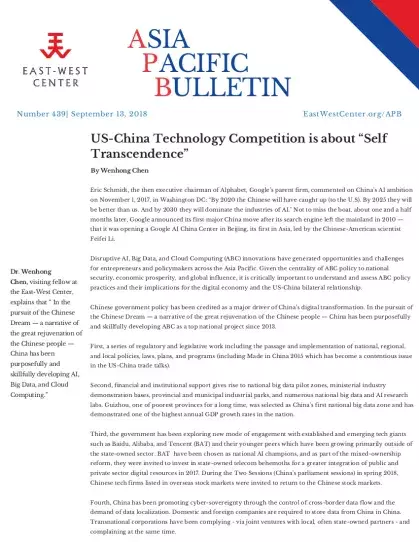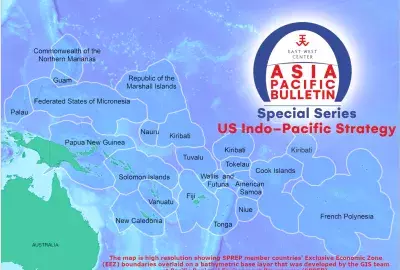Error message
Asia Pacific Bulletin
Asia Pacific Bulletin
US-China Technology Competition is about “Self Transcendence”
US-China Technology Competition is about “Self Transcendence”

|
Dr. Wenhong Chen, Visiting Fellow at the East-West Center, explains that “ In the pursuit of the Chinese Dream — a narrative of the great rejuvenation of the Chinese people — China has been purposefully and skillfully developing AI, Big Data, and Cloud Computing.” |
Eric Schmidt, then executive chairman of Alphabet, Google's parent firm, commented on China's AI ambition on November 1, 2017, in Washington DC: "By 2020 the Chinese will have caught up (to the United States). By 2025 they will be better than us. And by 2030 they will dominate the industries of AI." Not to miss the boat, about one and a half months later, Google announced its first major China move after its search engine left the mainland in 2010 — that it was opening a Google AI China Center in Beijing, its first in Asia, led by the Chinese-American scientist Feifei Li.
Disruptive AI, Big Data, and Cloud Computing (ABC) innovations have generated opportunities and challenges for entrepreneurs and policymakers across the Asia Pacific. Given the centrality of ABC policy to national security, economic prosperity, and global influence, it is critically important to understand and assess ABC policy practices and their implications for the digital economy and the US-China bilateral relationship.
Chinese government policy has been credited as a major driver of China’s digital transformation. In the pursuit of the Chinese Dream — a narrative of the great rejuvenation of the Chinese people — China has been purposefully and skillfully developing ABC as a top national project since 2013.
First, a series of regulatory and legislative work including the passage and implementation of national, regional, and local policies, laws, plans, and programs (including Made in China 2015 which has become a contentious issue in the US-China trade talks).
Second, financial and institutional support gives rise to national big data pilot zones, ministerial industry demonstration bases, provincial and municipal industrial parks, and numerous national big data and AI research labs. Guizhou, one of poorest provinces for a long time, was selected as China’s first national big data zone and has demonstrated one of the highest annual GDP growth rates in the nation.
Third, the government has been exploring new mode of engagement with established and emerging tech giants such as Baidu, Alibaba, and Tencent (BAT) and their younger peers which have been growing primarily outside of the state-owned sector. BAT have been chosen as national AI champions, and as part of the mixed-ownership reform, they were invited to invest in state-owned telecom behemoths for a greater integration of public and private sector digital resources in 2017. During the Two Sessions (China’s parliament sessions) in spring 2018, Chinese tech firms listed in overseas stock markets were invited to return to the Chinese stock markets.
Fourth, China has been promoting cyber-sovereignty through the control of cross-border data flow and the demand of data localization. Domestic and foreign companies are required to store data from China in China. Transnational corporations have been complying - via joint ventures with local, often state-owned partners - and complaining at the same time.
When asked by Senator Dan Sullivan at the Senate hearing on April 10, 2018 on whether Facebook and Mr. Zuckerberg were too powerful, Mr. Zuckerberg redirected: "And when I brought up the Chinese Internet companies, I think that that's a real strategic and competitive threat that, in American technology policy we should be thinking about." Henry Kissinger lamented that "Other countries have made AI a major national project. The United States has not yet, as a nation, sustematically explored its full scope, studied its implications, or begun the process of ultimate learning." America's ABC policy has been less systemativ than China's top-down, whole-of-government, national-strategy approach.
The Trump Administration’s ABC approach, if any, seems to center on economic security as an integral part of national security. The Department of Defense spent $7.4 billion in 2017 on ABC, and set AI as the cornerstone of America’s military dominance. Similar to other areas, the Administration is shifting from the multilateral approach to one of bilateralism. As importantly, the Administration has been more confrontational, accusing China of forced technology transfer and intellectual property theft, and threatening tariffs and other punitive actions. In particular, the Administration has demanded that the Chinese government give up its Made in China 2025 plan which aims to develop China’s ABC industries as world leaders.
The US inter-agency Committee on Foreign Investment in the United States (CFIUS) has been tightening scrutiny on Chinese investment in US critical infrastructure and technology. A bipartisan bill further expands and strengthens CFIUS oversight.
In addition to these protectionist measures, the Administration recently released a factsheet showcasing its AI efforts and achievement in terms of military and unclassified R&D investment, government service, regulatory barrier removal, talent training, and international collaboration. The White House Office of Science and Technology Policy (OSTP) organized an AI Summit with more than 30 American corporations and various federal agencies for better public and private AI coordination in May 2018. Although observers have different assessments on the Administration’s protectionist approach, it is time for the US to step up, starting with a long-term, more comprehensive tech policy framework, as well as greater investment in R&D.
While acknowledging the importance of ABC to national security and government efficiency, the federal government has been facing challenges such as 1) an aging IT infrastructure, 2) shortage of IT talent, and 3) tight budgets. Since President Trump took office, the Office of Science and Technology Policy (OSTP), the White House hub of innovation for the last four decades, has experienced substantial decline: the director position has not been filled and staff has dropped from 135 during the Obama administration to 45, and the majority have no science background.
As media and pundits fixate on a binary US-China tech competition, both Washington and Beijing need to carefully gauge the benefits and costs of US containing or engaging China as a strategic competitor. ABC related policies and practices are at the frontline. Perhaps Wang Yi, the Chinese foreign minister, says it the best that the aim of US-China relations is about “self-transcendence rather than replacing each other.”
|
Dr. Wenhong Chen, Visiting Fellow at the East-West Center, explains that “ In the pursuit of the Chinese Dream — a narrative of the great rejuvenation of the Chinese people — China has been purposefully and skillfully developing AI, Big Data, and Cloud Computing.” |
Eric Schmidt, then executive chairman of Alphabet, Google's parent firm, commented on China's AI ambition on November 1, 2017, in Washington DC: "By 2020 the Chinese will have caught up (to the United States). By 2025 they will be better than us. And by 2030 they will dominate the industries of AI." Not to miss the boat, about one and a half months later, Google announced its first major China move after its search engine left the mainland in 2010 — that it was opening a Google AI China Center in Beijing, its first in Asia, led by the Chinese-American scientist Feifei Li.
Disruptive AI, Big Data, and Cloud Computing (ABC) innovations have generated opportunities and challenges for entrepreneurs and policymakers across the Asia Pacific. Given the centrality of ABC policy to national security, economic prosperity, and global influence, it is critically important to understand and assess ABC policy practices and their implications for the digital economy and the US-China bilateral relationship.
Chinese government policy has been credited as a major driver of China’s digital transformation. In the pursuit of the Chinese Dream — a narrative of the great rejuvenation of the Chinese people — China has been purposefully and skillfully developing ABC as a top national project since 2013.
First, a series of regulatory and legislative work including the passage and implementation of national, regional, and local policies, laws, plans, and programs (including Made in China 2015 which has become a contentious issue in the US-China trade talks).
Second, financial and institutional support gives rise to national big data pilot zones, ministerial industry demonstration bases, provincial and municipal industrial parks, and numerous national big data and AI research labs. Guizhou, one of poorest provinces for a long time, was selected as China’s first national big data zone and has demonstrated one of the highest annual GDP growth rates in the nation.
Third, the government has been exploring new mode of engagement with established and emerging tech giants such as Baidu, Alibaba, and Tencent (BAT) and their younger peers which have been growing primarily outside of the state-owned sector. BAT have been chosen as national AI champions, and as part of the mixed-ownership reform, they were invited to invest in state-owned telecom behemoths for a greater integration of public and private sector digital resources in 2017. During the Two Sessions (China’s parliament sessions) in spring 2018, Chinese tech firms listed in overseas stock markets were invited to return to the Chinese stock markets.
Fourth, China has been promoting cyber-sovereignty through the control of cross-border data flow and the demand of data localization. Domestic and foreign companies are required to store data from China in China. Transnational corporations have been complying - via joint ventures with local, often state-owned partners - and complaining at the same time.
When asked by Senator Dan Sullivan at the Senate hearing on April 10, 2018 on whether Facebook and Mr. Zuckerberg were too powerful, Mr. Zuckerberg redirected: "And when I brought up the Chinese Internet companies, I think that that's a real strategic and competitive threat that, in American technology policy we should be thinking about." Henry Kissinger lamented that "Other countries have made AI a major national project. The United States has not yet, as a nation, sustematically explored its full scope, studied its implications, or begun the process of ultimate learning." America's ABC policy has been less systemativ than China's top-down, whole-of-government, national-strategy approach.
The Trump Administration’s ABC approach, if any, seems to center on economic security as an integral part of national security. The Department of Defense spent $7.4 billion in 2017 on ABC, and set AI as the cornerstone of America’s military dominance. Similar to other areas, the Administration is shifting from the multilateral approach to one of bilateralism. As importantly, the Administration has been more confrontational, accusing China of forced technology transfer and intellectual property theft, and threatening tariffs and other punitive actions. In particular, the Administration has demanded that the Chinese government give up its Made in China 2025 plan which aims to develop China’s ABC industries as world leaders.
The US inter-agency Committee on Foreign Investment in the United States (CFIUS) has been tightening scrutiny on Chinese investment in US critical infrastructure and technology. A bipartisan bill further expands and strengthens CFIUS oversight.
In addition to these protectionist measures, the Administration recently released a factsheet showcasing its AI efforts and achievement in terms of military and unclassified R&D investment, government service, regulatory barrier removal, talent training, and international collaboration. The White House Office of Science and Technology Policy (OSTP) organized an AI Summit with more than 30 American corporations and various federal agencies for better public and private AI coordination in May 2018. Although observers have different assessments on the Administration’s protectionist approach, it is time for the US to step up, starting with a long-term, more comprehensive tech policy framework, as well as greater investment in R&D.
While acknowledging the importance of ABC to national security and government efficiency, the federal government has been facing challenges such as 1) an aging IT infrastructure, 2) shortage of IT talent, and 3) tight budgets. Since President Trump took office, the Office of Science and Technology Policy (OSTP), the White House hub of innovation for the last four decades, has experienced substantial decline: the director position has not been filled and staff has dropped from 135 during the Obama administration to 45, and the majority have no science background.
As media and pundits fixate on a binary US-China tech competition, both Washington and Beijing need to carefully gauge the benefits and costs of US containing or engaging China as a strategic competitor. ABC related policies and practices are at the frontline. Perhaps Wang Yi, the Chinese foreign minister, says it the best that the aim of US-China relations is about “self-transcendence rather than replacing each other.”







